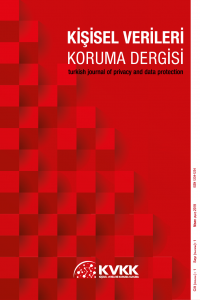The Privacy Paradox Is Not Real
privacy paradox, privacy preferences, risk assessment, decision-making processes, privacy laws, privacy protection mechanisms
THE PRIVACY PARADOX IS NOT REAL
privacy paradox, privacy preferences, risk assessment, decision-making processes, privacy laws, privacy protection mechanisms,
___
- Acquisti, A., & Grossklags, J. (2005). Privacy and rationality in individual decision making. IEEE Security Privacy, 3(1), 26-33. https://doi.org/10.1109/MSP.2005.22
- Acquisti, A., Taylor, C., & Wagman, L. (2016). The Economics of Privacy. Journal of Economic Literature, 54(2), 442-492. https://doi.org/10.1257/jel.54.2.442
- Barnes, S. B. (2006). A privacy paradox: Social networking in the United States. First Monday. https://doi.org/10.5210/fm.v11i9.1394
- Barth, S., D.T. de Jong, M., Junger, M., Hartel, P. H., & Roppelt, J. C. (t.y.). Putting the privacy paradox to the test_ Online privacy and security behaviors among users with technical knowledge, privacy awareness, and financial resources | Elsevier Enhanced Reader. Telematics and Informatics. https://doi.org/10.1016/j.tele.2019.03.003
- Brandimarte, L., Acquisti, A., & Loewenstein, G. (2013). Misplaced Confidences: Privacy and the Control Paradox. Social Psychological and Personality Science, 4(3), 340-347. https://doi.org/10.1177/1948550612455931
- Brown, B. (2001). Studying the internet experience. Hewlett Packard. https://www.hpl.hp.com/techreports/2001/HPL-2001-49.pdf
- Danezis, G., & Golle, P. (Ed.). (2006). Privacy enhancing technologies: 6th international workshop, PET 2006, Cambridge, UK, June 28-30, 2006: revised selected papers. Springer Dienlin, T., Masur, P. K., & Trepte, S. (2021). A longitudinal analysis of the privacy paradox. New Media & Society, 1-22. https://doi.org/10.1177/14614448211016316
- Federal Trade Commission. (2008). Protecting Consumers in the Next Tech-ade: A Report by the Staff of the Federal Trade Commission. A Report by the Staff of the Federal Trade Commission, 50.
- Francis, J. G., & Francis, L. (2017). Privacy: What everyone needs to know. Oxford University Press.
- Gerber, N., Gerber, P., & Volkamer, M. (2018). Explaining the privacy paradox: A systematic review of literature investigating privacy attitude and behavior. Computers & Security, 77, 226-261. https://doi.org/10.1016/j.cose.2018.04.002
- Grossklags, J., & Acquisti, A. (t.y.). When 25 Cents is too much: An Experiment on Willingness-To-Sell and Willingness-To-Protect Personal Information. 22 Hargittai, E., & Marwick, A. (2016). “What Can I Really Do?” Explaining the Privacy Paradox with Online Apathy. International Journal of Communication, 10(0), Art. 0.
- Henkin, L. (1974). Privacy and Autonomy. Columbia Law Review, 74(8), 1410-1433. https://doi.org/10.2307/1121541
- Hoffmann, C. P., Lutz, C., & Ranzini, G. (2016). Privacy cynicism: A new approach to the privacy paradox. Cyberpsychology: Journal of Psychosocial Research on Cyberspace, 10(4), Art. 4. https://doi.org/10.5817/CP2016-4-7
- Josephson, M. S. (t.y.). Miller: The Assault on Privacy. Michigan Law Review, 69, 10.
- Kokolakis, S. (2017). Privacy attitudes and privacy behaviour: A review of current research on the privacy paradox phenomenon. Computers & Security, 64, 122-134. https://doi.org/10.1016/j.cose.2015.07.002
- Lim, S. (2021). Tackling Privacy Paradox: Protecting Right to Self-determination of Personal Information by Estimating the Economic Value of Personal Information and Visualizing the Price. International Journal of Internet, Broadcasting and Communication, 13(2), 244-259. https://doi.org/10.7236/IJIBC.2021.13.2.244
- Martin, K., & Nissenbaum, H. (2017). Measuring Privacy: An Empirical Test Using Context to Expose Confounding Variables. Columbia Science & Technology Law Review, 18, 176-218.
- McDonald, A. M., & Cranor, L. F. (2008). The Cost of Reading Privacy Policies. I/S: A Journal of Law and Policy for the Information Society, 4, 543.
- McGeveran, W. (2015). The Law of Friction. University of Chicago Legal Forum, 2013(1).
- Norberg, P. A., Horne, D. R., & Horne, D. A. (2007). The Privacy Paradox: Personal Information Disclosure Intentions versus Behaviors. Journal of Consumer Affairs, 41(1), 100-126. https://doi.org/10.1111/j.1745-6606.2006.00070.x
- Parker, R. B. (1973). A Definition of Privacy. Rutgers Law Review, 27(2), 275-297.
- Posner, R. A. (1978). Privacy, Secrecy, and Reputation. Buffalo Law Review, 28(1), 1-56.
- Rachels, J. (1975). Why Privacy is Important. Philosophy & Public Affairs, 4(4), 323-333. Sloot, B. van der. (2021). The right to be let alone by oneself: Narrative and identity in a data-driven environment. Law, Innovation and Technology, 13(1), 223-255. https://doi.org/10.1080/17579961.2021.1898315 Solove, D. (2020). The Myth of the Privacy Paradox. GW Law Faculty Publications & Other Works.
- Solove, D. J. (2008). Understanding privacy. Harvard University Press.
- Spiekermann, S., Grossklags, J., & Berendt, B. (t.y.). E-privacy in 2nd generation E-commerce | Proceedings of the 3rd ACM conference on Electronic Commerce.
- Strahilevitz, L., & Kugler, M. (2016). Is Privacy Policy Language Irrelevant to Consumers? The Journal of Legal Studies, 45, S69-S95. https://doi.org/10.1086/689933
- Tsai, J. Y., Egelman, S., Cranor, L., & Acquisti, A. (2011). The Effect of Online Privacy Information on Purchasing Behavior: An Experimental Study. Information Systems Research, 22(2), 254-268. https://doi.org/10.1287/isre.1090.0260
- Tversky, A., & Kahneman, D. (1974). Judgment under Uncertainty: Heuristics and Biases. Science, 185(4157), 1124-1131.
- Vaidhyanathan, S. (2012). The Googlization of everything: And why we should worry. University of California press.
- Westin, A. F. (1968). Privacy and freedom. The Washington and Lee Law Review, 25(1).
- ISSN: 2667-6524
- Yayın Aralığı: Yılda 2 Sayı
- Başlangıç: 2019
- Yayıncı: Kişisel Verileri Koruma Kurumu
AB ve Türk Hukukunda Veri İhlalinin Tespiti ve Bildirim Süresinin Karşılaştırmalı Değerlendirmesi
Nur Sena SEVİNDİ, Muhammet Emin ORDU
Yüz Tanıma Teknolojilerinin Kişisel Verilerin Korunması Hukuku Açısından İncelenmesi
6698 Sayılı Kanun’a Uyumlu Yazılımların Geliştirilmesi ve Yapay Zekâ Uygulamaları
